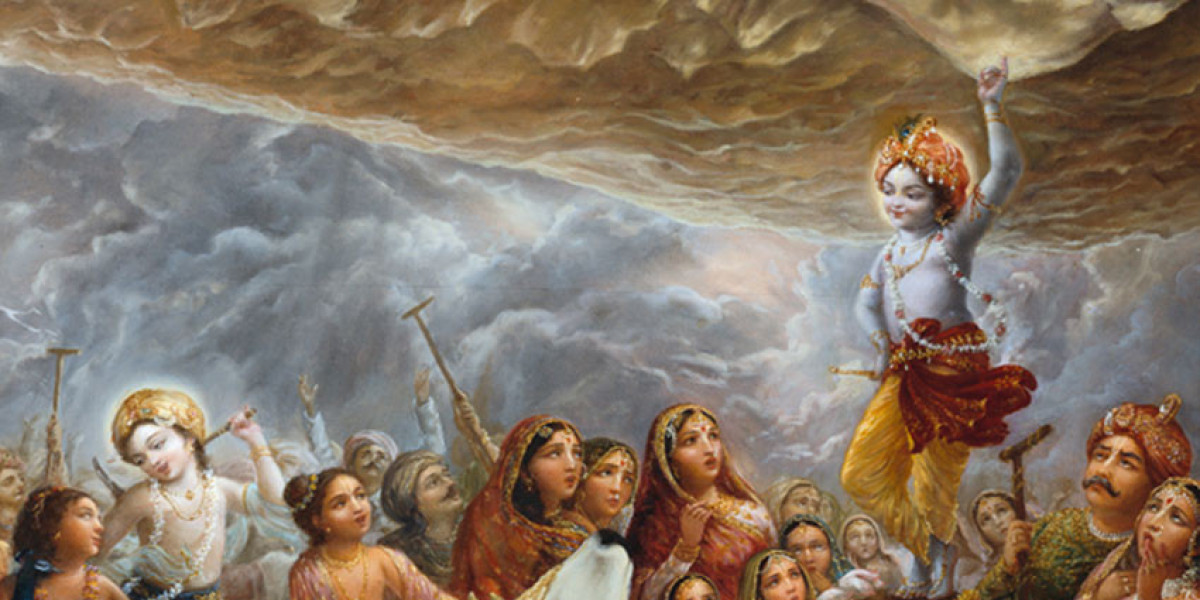Diwali, the festival of lights, is often associated with the triumph of good over evil and the welcoming of prosperity into our homes. However, beneath the festivities lies a profound connection to nature, especially during Govardhan Puja, which falls on the fourth day of Diwali. This celebration focuses on Gaumata (the sacred cow) and the use of cow dung—symbolic elements that highlight ancient environmental wisdom and spiritual values.
Preparations for the festival of Diwali are going on in full swing. Govardhan Puja is performed as per the rituals on the next day of Diwali celebration. The practice of Govardhan Puja has been going on not from today but since the Dwaparayug of Shri Krishna. But do you know why Govardhan Puja is performed and what is its religious and mythological significance. Also, why it is always considered auspicious and necessary to use the dung of Desi cow i.e. our mother cow in making Govardhan. Let us tell you all the stories and beliefs related to Govardhan Puja.
This article delves into the significance of Gaumata and cow dung in Diwali, exploring their role in traditions, rituals, and modern sustainability.
Gaumata: The Sacred Cow in Indian Tradition
Gaumata, or the revered cow, holds an esteemed position in Indian culture and religious practices. For centuries, cows have been considered not only sources of sustenance but also symbols of purity, selflessness, and abundance. Every part of the cow, from milk to manure, plays a crucial role in maintaining harmony in both spiritual and ecological spheres.
During Diwali, the importance of Gaumata is celebrated through Govardhan Puja. According to Hindu mythology, the young Krishna urged the people of Vrindavan to worship Govardhan Hill and their cows, instead of appeasing Lord Indra, the god of rain. The act of worshipping cows during this festival symbolizes gratitude toward animals and nature for sustaining life.
Cows are seen as givers of life, providing essential dairy products such as milk, ghee, curd, and butter, which are used not only for nourishment but also in sacred rituals. The spiritual bond between humans and cows is further reflected in the belief that serving Gaumata leads to prosperity, peace, and blessings.
Cow Dung: A Sacred and Sustainable Offering
Cow dung, often overlooked in modern societies, carries immense spiritual, agricultural, and ecological value in Indian traditions. Its inclusion in Govardhan Puja and other festivals emphasizes the ancient practice of honoring natural resources. Here are the key aspects of its significance:
Symbol of Purity and Ritual Use
In Hindu rituals, cow dung is considered sacred and purifying. It is often used to coat the floors of homes and temples, creating an antiseptic surface that is believed to ward off negative energies. During Govardhan Puja, cow dung is shaped into small mounds representing Govardhan Hill, which devotees decorate with flowers, turmeric, and kumkum. These symbolic hills are offered prayers and circumambulated, reinforcing devotion to nature.Natural Fertilizer for Agriculture
One of the earliest forms of organic farming involved the use of cow dung as a fertilizer. Rich in essential nutrients like nitrogen and phosphorus, cow dung enhances soil fertility and supports sustainable agriculture. This aligns with the festival’s message to respect the natural world that feeds us. Using cow dung for farming also reduces chemical pollution, benefiting both the environment and future generations.Eco-Friendly Fuel Source
In rural India, cow dung is dried and used as an alternative to firewood. Burning cow dung cakes produces minimal emissions compared to conventional fossil fuels, making it a more sustainable and eco-friendly option. The tradition of using these cakes for Diwali rituals and cooking demonstrates how ancient practices promoted environmental consciousness.Antibacterial Properties and Home Use
Scientific studies have confirmed that cow dung has antibacterial and antifungal properties, which explains its use in traditional Indian homes. Even today, it is applied to the walls and floors of rural homes to maintain hygiene and deter insects. This practice showcases the integration of eco-conscious living into daily life.
The Eco-Spiritual Message of Govardhan Puja
Govardhan Puja reminds people of the interconnectedness between humans, animals, and the environment. The worship of Gaumata and the use of cow dung reflect the principle that everything in nature has a purpose and must be respected. This celebration offers timeless lessons for modern society:
Sustainable Living: By promoting the use of natural resources like cow dung for farming and fuel, the festival encourages eco-friendly practices.
Respect for Animals: Honoring cows through rituals reinforces the importance of animal welfare and compassion. Supporting initiatives such as Gaushalas (cow shelters) ensures the protection and care of these sacred animals.
Gratitude toward Nature: Diwali is not only about wealth and prosperity but also about acknowledging the gifts of nature that sustain life.
The Role of Gaushalas in Preserving Tradition
Gaushalas, or cow shelters, play a critical role in carrying forward the values of Govardhan Puja. These shelters house old or abandoned cows and provide them with food, shelter, and medical care. Many Gaushalas also produce organic manure, biogas, and natural medicines using cow dung and cow urine, promoting sustainable practices.
Supporting Gaushalas is a way of contributing to animal welfare and environmental conservation, reflecting the spirit of Govardhan Puja in action.
Reviving Ancient Wisdom for Modern Sustainability
In an age where climate change, pollution, and resource depletion are pressing global issues, the ancient practices celebrated during Govardhan Puja offer profound insights. Modern lifestyles often lead to environmental degradation, but the values embedded in this festival remind us of the importance of sustainable living.
Organic Farming and Soil Health: Encouraging the use of cow dung-based fertilizers helps restore soil fertility and reduces the use of harmful chemicals.
Eco-Friendly Energy Alternatives: Promoting cow dung cakes as fuel can help reduce carbon footprints and mitigate deforestation caused by excessive wood burning.
Community and Spiritual Connection: Festivals like Govardhan Puja nurture a sense of community responsibility toward animals and nature, fostering a holistic approach to well-being.
By revisiting these time-honored traditions, we can revive practices that benefit both individuals and the environment.
Conclusion: Embracing the Spirit of Gaumata and Cow Dung in Diwali
The significance of Gaumata and cow dung in Diwali goes beyond rituals and customs. These elements embody the essence of gratitude, sustainability, and harmony with nature. As we celebrate Diwali with lights and festivities, it is essential to remember the deeper message behind Govardhan Puja: honoring the gifts of Gaumata and the natural world.
By integrating these ancient practices into modern life, we can move toward a more sustainable and compassionate way of living. Whether it’s through supporting Gaushalas, using eco-friendly alternatives, or embracing organic farming, the wisdom of Govardhan Puja remains relevant. This Diwali, let us light the way not only with diyas but also with conscious actions that reflect reverence for the Earth and all its creatures.
This article explores the spiritual and ecological significance of Govardhan Puja, emphasizing the importance of Gaumata and cow dung. To learn more about related traditions and sustainable practices, visit the Govardhan Puja: Significance of Gaumata and Cow Dung in Diwali.








